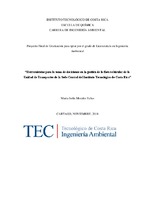Herramientas para la toma de decisiones en la gestión de la flota vehicular de la Unidad de Transportes de la Sede Central del Instituto Tecnológico de Costa Rica
Abstract
The inventory of gases prepared in 2017 by the Technological Institute of Costa Rica (ITCR), identified that, of the total carbon dioxide generated using fuel in its Headquarters, the Transportation Unit issued 74%. In order to reduce this percentage and contribute to the carbon neutrality goal of the institution, the initial situation of the fleet was defined, from which its composition and fuel consumption were established; A new vehicle allocation methodology was proposed based on the characteristics of each service and the fuel consumption performance and; Finally, a literature review was carried out to establish the environmental criteria to be included in a new vehicle acquisition model, considering both internal combustion vehicles, as well as hybrids and electric vehicles. Because of this investigation, it was identified that the fleet consists of 32 vehicles, of which 4 are non-pluggable hybrids and 28 are internal combustion, with outputs from 9.17 to 14.26 l / 100 km. In addition, a new acquisition model was proposed to evaluate the performance and environmental impact of the vehicle during its use, through criteria such as energy consumption, CO2 emission and the Euro or Tier standards of the vehicles. Finally, the distance of the trip was integrated into the allocation, which allows the individual fuel consumption data of the institutional monitoring software to be considered, to provide a list in order of efficiency of the units with the capacity to meet the needs and conditions required. for the trip.
Description
Proyecto de Graduación (Licenciatura en Ingeniería Ambiental) Instituto Tecnológico de Costa Rica, Escuela de Química, 2018.


